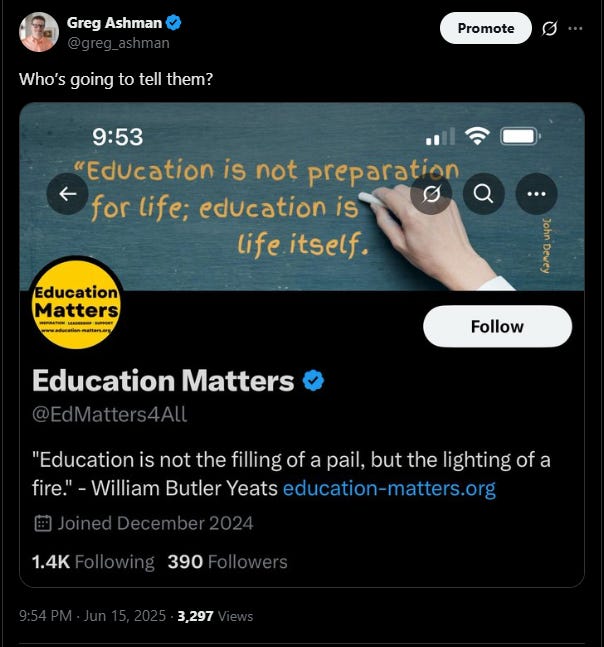The week started on Mount Buninyong, an extinct volcano that has featured in Curios before. It was probably wise to get some fresh air because seasonal cold and flu swept through Ballarat, sending students and staff home. As a result, we have had a lot of ‘reserves’ where remaining teachers cover classes for absent ones. I have taught a couple of global politics lessons and have learned all about the United Nations, its structure and a policy called, ‘responsibility to protect’ that has only been invoked once. I found it utterly fascinating.
Our senior students, including my eldest daughter, also completed the General Achievement Test or GAT. This assesses mathematics, reading, writing and general knowledge but is not a traditional exam leading to a certificate. Instead, it is used as a backup to the VCE exams they complete. For instance, if a student suffers a major illness that means they cannot sit their VCE examinations, the GAT will be used as part of the process for deriving estimated scores. It is not like anything we had in England.
This week’s Curios include intelligence, the value of narrative, testing four-year-olds on iPads and much more.
Intelligence quotient of the week
There is a strange group of people who take a fundamentalist stance on general intelligence and its measurement—what we commonly call IQ tests. Anyone who takes a serious look at the matter will be aware that intelligence is at least partly genetic and that intelligence tests tend to be strongly predictive of later life outcomes. However, fundamentalists take the position that intelligence tests are so predictive that even education does not really matter.
I remember meeting a guy at a conference once who took this position and argued that education was therefore all about signalling: we don’t take a hard course at university to make ourselves more intelligent, we do so to signal how intelligent we already are.
This is why I was struck by a thread on Twitter/X that debunks the claim that education is not important.
If you are not on Twitter/X then you can read it here.
I am impressed with Richard’s command of the technical arguments, but I have a much simpler one. We have known for some time that general intelligence has two components—fluid intelligence and crystallised intelligence. Fluid intelligence is our raw processing power but crystallised intelligence is a result of what we know and have stored in long-term memory. When solving a problem, we bring both to bear and often, crystallised intelligence more than compensates for any lack of fluid intelligence. Take, for example, the following problem:
Hendo has sheep and kangaroos in his paddock. In total, there are 25 animals in the paddock and between them, they have 78 legs. How many sheep are there?
If you have lots of fluid intelligence and you know how many legs sheep and kangaroos have—the problem only works if you assume it’s 4 and 2, although the latter figure is ambiguous—then you will probably work this out. However, if you have been taught how to solve problems like this with simultaneous equations, you will probably work it out more quickly.
Education works by increasing our crystallised intelligence.
Zombie quote of the week
The reason this Substack is called Filling the Pail is because of a popular misquote. As the tagline goes, ‘“Education is not the filling of a pail, but the lighting of a fire." – As W. B. Yeats never said’.
That’s right, W. B. Yeats never said this. Instead, it originates in a slightly different form in an essay by Plutarch, On Listening to Lectures, where Plutarch advises the young Nicander how he should approach such events. The Yeats attribution appears to come from the correctly cited quote being placed next to a quite different quote from Yeats in a 1968 book. Nevertheless, an outfit ironically called Education Matters uses the quote as a strapline for its Twitter/X account.
This kind of thing makes educators look unserious.
The true origin in Plutarch is enlightening. He does not mean what most people using that quote seem to mean. As I explored in an old post when I first alighted upon a name for my blog, in the same essay, Plutarch states:
“As skilful horse-trainers give us horses with a good mouth for the bit, so too skilful educators give us children with a good ear for speech, by teaching them to hear much and speak little.”
Plutarch’s opinions are Plutarch’s opinions—no more or less than that—but I am certain those misquoting him on filling pails and lighting fires would wish to distance themselves from this particular perspective.
And for completeness, the John Dewey quote that Education Matters uses in its account photo is also a misquote.
Legal action of the week
I have been aware of Dr Stephen Vainker’s accusations against Professor John Hattie for some time. When I wrote a piece last year pointing out that a few of Vainker’s points about Hattie’s research that I attempted to verify were factually wrong, I made the following clear:
“I am not going to repeat some of Vainker’s claims about Hattie because if he cannot prove them then they are deeply defamatory. I don’t want to get involved with that.”
Keep reading with a 7-day free trial
Subscribe to Filling The Pail to keep reading this post and get 7 days of free access to the full post archives.







